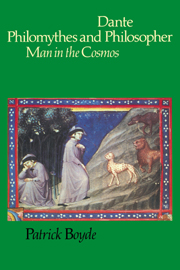5 - The natural world and the Scale of Being
Published online by Cambridge University Press: 17 September 2009
Summary
The ‘Comedy’ as microcosm
in his famous preface to what was to be the first printed commentary on the Comedy, the fifteenth-century humanist Cristoforo Landino wrote:
Dante's similes are so original that I can find no simile to convey their originality. His comparisons are beyond compare. They are more exact and more frequent than in any other poet and simply more true to life. They are wonderfully effective in expressing the poet's state of mind and are superbly adapted to their location. The similes in the Inferno are not drawn from the same sources as those in the Paradiso; rather, each seems fitted by nature to its context. Furthermore, Dante's comparisons often lay bare the workings of some natural agency, or instruct the reader about some thing in nature.
Landino makes several distinct points in this paragraph, and it will be generally agreed that they are quite well taken. Dante's similes are both numerous and new. Many of them do reveal his powers of close observation. They are often informative; and, taken as a whole, they do enable him to enrich his poem about man and God with a profusion of references to ‘the grass, the herb yielding seed, and the fruit tree yielding fruit, the fish of the sea, the fowl of the air, the cattle, the beasts and every creeping thing that creepeth upon the earth’.
- Type
- Chapter
- Information
- Dante Philomythes and PhilosopherMan in the Cosmos, pp. 112 - 131Publisher: Cambridge University PressPrint publication year: 1981



